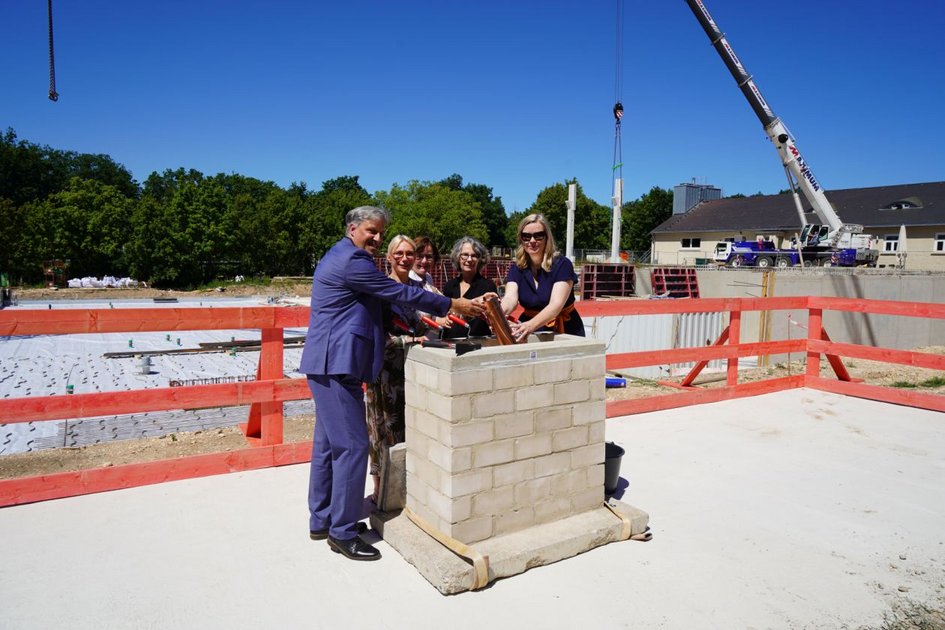A modern sports and exercise centre is being built on the Wolfenbüttel campus of Ostfalia University. The foundation stone was symbolically laid at Exer on Tuesday, 1 July 2025.
Dr Sandra Roddewig, Head of the Central Services, Legal and Building Affairs Department of the Ministry of Science and Culture (MWK), emphasised that the new sports hall would create a place for exercise, learning and meeting: "As a state, we are investing in education, health, inclusion and sustainability here - in the future of the students and the university. It will offer optimal conditions for university sports, teaching and research here in Wolfenbüttel and at the same time be a place that further strengthens the connection between the university and the region."
"The new hall will provide attractive and flexible spaces for our diverse university sports programme and courses. This will significantly enhance our campus in Wolfenbüttel," said Ostfalia President Prof Julia Siegmüller in front of the invited guests from the university, politics and business at the ceremony.
The city of Wolfenbüttel was also represented at the laying of the foundation stone. The First City Councillor, Thorsten Drahn, expressed his congratulations: "The Wolfenbüttel City Council and administration congratulate Ostfalia University and the Lower Saxony Ministry of Science and Culture on their courageous decision to build a modern sports hall on the university site on the Exer. This multi-million euro investment not only represents a huge step forward for university sports, but also offers other groups an additional and fantastic opportunity for sporting activities in the future within the scope of the available capacity. The hall will enrich the Wolfenbüttel sports landscape immensely. We are very pleased about that."
According to the current schedule, completion of the new hall is planned for the end of 2026, with the move in at the turn of the year 2026/2027.
"During the planning phase, we placed particular emphasis on accessibility in order to enable inclusive sport. The new hall will play a pioneering role in this regard," said Thomas Popp, Head of State Building Management Braunschweig.
The new hall, designed by [pfitzner moorkens] architekten, will have a usable area of 1,500 m² and, in addition to the actual sports hall, will also offer rooms for strength and gymnastics training as well as an office space and a seminar room. In addition to university sports programmes, the hall will also provide space for teaching and further education, particularly for the Faculty of Social Work. As before, free hall times will also be allocated to clubs, kindergartens, company sports groups and organisations for people with disabilities.
The hall differs significantly from standard sports halls in a number of ways. Due to the barrier-free design, the sanitary facilities and changing rooms in particular are more spacious than in comparable halls and the hall can also accommodate up to 150 spectators in a retractable stand.
"With the planned photovoltaic system on the roof to supply its own electricity and the hall's energy supply from the university's local heating network and the planned switch to renewable energy sources, the hall will also achieve the climate-neutral energy supply target set by the state," says a delighted Roland Distler, Head of Building Management at Ostfalia University. The costs for the project amount to 13.15 million euros, including the initial installation. The Ministry of Science and Culture is providing 5 million euros in direct funding, while the university is contributing 8.15 million euros from reserves.

